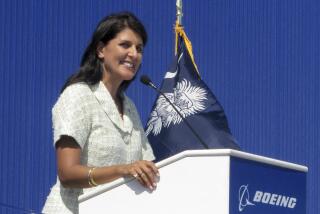Rice Steps Aside in Teledyne Action : Aerospace: Former Air Force secretary won’t take a direct role in fighting possible debarment of the company’s Relays unit.
- Share via
Teledyne President Donald Rice, who until January was secretary of the Air Force, has excused himself from a direct role in the company’s effort to head off possible punitive measures by the Defense Department against one of its subsidiaries, Pentagon and company officials said Thursday.
The Defense Department is considering debarring Teledyne Relays, meaning the unit would be indefinitely or permanently ineligible for future military contracts, the company disclosed in a recent Securities and Exchange Commission filing.
Meanwhile, Teledyne Chairman William Rutledge and Rice broke a long silence by top company officers Thursday and described for reporters the company’s extensive efforts to strengthen its compliance with federal regulations.
A debarment of the unit would be the first against a major defense contractor in decades and perhaps the first in U.S. history. The unit was temporarily suspended from receiving new contracts last year after it pleaded guilty to felony charges of falsifying testing on 9 million electronic components.
Teledyne agreed to pay a $17.5-million criminal fine to settle the case.
The Defense Logistics Agency, which has responsibility for the debarment action, had been prepared to issue a debarment last month, but postponed action pending the receipt of more information from Teledyne, according to a Pentagon official.
“It looked like Rice was going to be able to help the situation quite a bit, but then he recused himself,” the Pentagon official said.
Rice apparently had little choice. In a wide-ranging interview, he said Thursday that under federal law he could have no direct contact with the Defense Department on any matter for a year and no direct contact with Air Force matters for two years. The extent to which federal “revolving door” laws have constrained former Pentagon officials in their new private-sector jobs has varied widely depending on their interpretation.
Rice also said he has recused himself from any internal involvement with the firm’s McCormick Selph unit in Hollister, Calif., until August. That unit is a subcontractor on the F-22 jet fighter program, a contract awarded during Rice’s tenure as Air Force chief.
When Rice was named Teledyne president last month, it was widely assumed that he could provide substantial assistance in helping the Century City-based defense company extricate itself from serious legal difficulties at a number of its autonomous units.
Four of its units are facing investigations by federal grand juries, and the Justice Department has intervened in three civil fraud cases.
Rice gained a reputation for integrity during his years as Air Force secretary. But he said Thursday that any potential he had to help the firm with its ethics problems played no part in his decision to accept the job.
Rutledge agreed that the image issue “played no part in our decision” to recruit Rice.
“As far as I am concerned, our decision process was based on his expertise in managing complex organizations involved in high technology,” the chairman said. Prior to his service as Air Force secretary, Rice was president of RAND Corp., the Santa Monica-based think tank.
Rutledge and Rice said Teledyne has speeded up a series of ethics audits and reviews at each of the company’s more than 60 units in an effort to satisfy themselves that Teledyne is complying with federal laws and to demonstrate the same to regulators. The company has hired 22 ethics auditors to help with the job.
More to Read
Inside the business of entertainment
The Wide Shot brings you news, analysis and insights on everything from streaming wars to production — and what it all means for the future.
You may occasionally receive promotional content from the Los Angeles Times.











